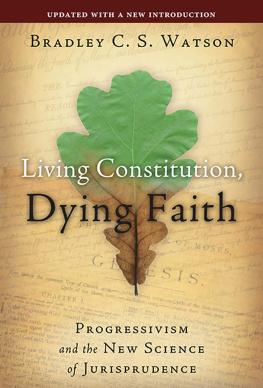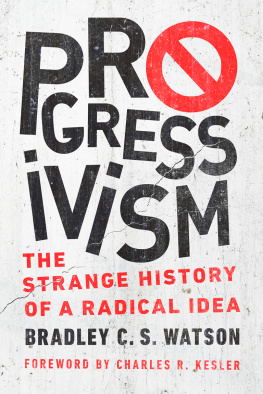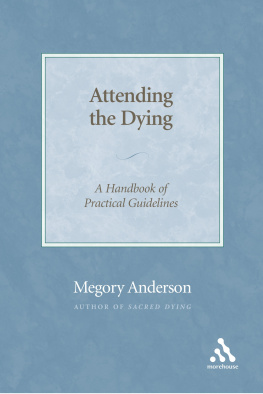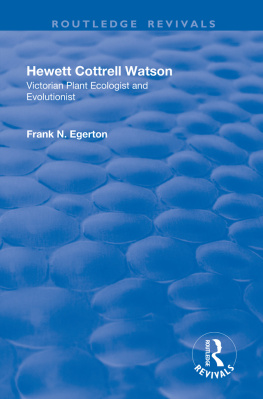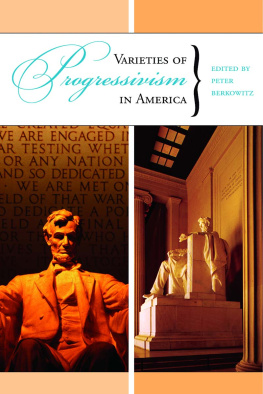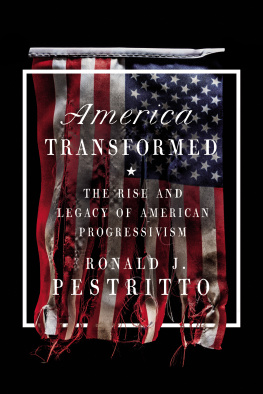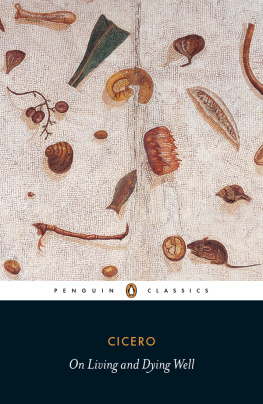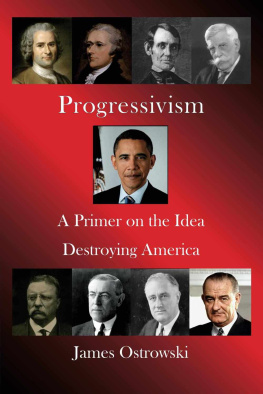Living Constitution, Dying Faith
Progressivism and the New Science of Jurisprudence
Bradley C. S. Watson
I dedicate this book to the memory of my parents,
Charles W. and Nelsie Watson
the all resistless hurricane has swept over them
Contents
Chapter 1
The Organic Constitution
Chapter 2
The Constitution of the Fathers
Chapter 3
The Social Darwinist Moment
Chapter 4
Progressive Political Leadership
Chapter 5
The New Science of Jurisprudence
Chapter 6
Academic Progressivism
Chapter 7
The Future Is Now
Let us have faith that right makes might, and in that faith, let us, to the end, dare to do our duty as we understand it.
Abraham Lincoln
Ever in the making, as law develops through the centuries, is this new faith which silently and steadily effaces our mistakes.... [W]e worry ourselves overmuch about the enduring consequences of our errors.... The future takes care of such things.
Benjamin N. Cardozo
Acknowledgments
I am exceedingly grateful to ISI Books, and especially its editor, Jed Donahue. He has been a pleasure to work withfrom initial publication through the many years this book has been in print. At Jeds prompting, the book is now going to a paperback edition. I hope this will help bring it to the attention of a new generation of readers.
No book springs fully formed from the mind of its author alone, and this one is certainly no exception. I owe many debts of gratitude to those who helped me think through my topic and then commit my thoughts to paper. I wrote most of the book during a sabbatical year at Princeton, where I was a visiting fellow in the James Madison Program in American Ideals and Institutions at Princeton University. The program provides Princetonand the nationwith a unique center for the study of American political institutions and principles and their relationship to the great moral, cultural, and philosophic problems of our times and all times. To speak of the program is necessarily to speak also of its founder and director, Professor Robert P. George. His boundless energyand dedication to promoting the moral and intellectual virtues to the glory of Godought to be an inspiration to the entire academic world.
I am also grateful to Bradford P. Wilson, the Madison Programs executive director, who has worked tirelessly on behalf of the interests of the visiting fellows, and who commented on various parts of this book in the manuscript stages. While at Princeton, I benefited enormously from the regular intellectual stimulation and generous advice offered by the other visiting fellows of the Madison Program. And I must say, too, that I benefited from the occasional gauntlets laid down by them: Alan Gibson, Matthew Holland, Carson Holloway, Catherine McCauliff, and Paul Morenoall of whom I now call friends. When I presented a part of the present work as a public paper at Princeton, I was fortunate enough to have in the audience Walter F. Murphy, whose penetrating questions led me to clarify my arguments on the nature of the American founding, and in particular Lincolns interpretation of it.
Less proximately, but no less importantly, I am thankful for the extraordinary environment of the political philosophy program at the Claremont Graduate University, where I finished my doctorate. It was there that I came to see progressivisms enduring importance for American politics. I owe special thanks to Charles R. Kesler, who introduced me to the thought of so many of the progressives with whom I deal in this volume.
Though Im formally identified as a political scientist, I dont especially embrace this identification, at least in its current significations. I consider myself rather a teacher, and student, of the Great Books of Western civilization and the great political writings of the American tradition. The fact that this aspiration has remained largely a reality is due very much to my home institution, Saint Vincent College. Gary M. Quinlivan, the dean of the academic division of Saint Vincent in which I residethe Alex G. McKenna School of Business, Economics, and Governmentfaces the daunting task of harmonizing the theoretical and the practical, and strives mightily not to stint the former for the sake of the latter. At Saint Vincent, where Ive long been supported and protected against many of the most fashionable and pernicious trends in contemporary higher education, Ive been relatively free to be a guide for my studentsas best I can beto the complex and fascinating relationship between ideas and action. I have been free also to dwell on the eternal questions of politics and human liferight and wrong, justice and injustice, good and evil. The extent to which I can successfully do these things is subject mostly to my ownnot institutionallimitations.
There were people I should have acknowledged in the first edition of this book but didnt. Ive always regretted that, and Im very happy to correct the oversight here. They are the many students in my American Political Thought class, which Ive now taught for more than two decades at Saint Vincent. The class surveys the intellectual origins of progressivism, the ideas and institutions against which it rebelled, and the political and jurisprudential consequences of that rebellion. It was that class, more than anything else, that gave birth to this book. For years, as I taught and refined what I was teachingwith countless inputs from students (some were silent, but nevertheless spoke very clearly!)I recall thinking: Theres an important book in all of this. Somebody needs to write it. Then I realized who that somebody was.
Unfortunately, I always find writing to be a painful struggle. As usual, my familyBarbara, Victoria, Charles, and Jamesbore the brunt of my absences as I struggled to complete this volume. I am grateful to them.
It should go without sayingbut I will say it anywaythat errors and oversights in this work are faults of mine, and not of those who have instructed, advised, or inspired me.
Introduction to the
Paperback Edition
Changed understandings of marriage are characteristic of a Nation where new dimensions of freedom become apparent to new generations.... The generations that wrote and ratified the Bill of Rights and the Fourteenth Amendment did not presume to know the extent of freedom in all of its dimensions.... The limitation of marriage to opposite-sex couples may long have seemed natural and just, but its inconsistency with the central meaning of the fundamental right to marry is now manifest.
Thus did Justice Anthony Kennedy invoke the living Constitutionwhich amounts to no Constitution at allin his majority opinion in Obergefell v. Hodges (2015). He based his extension of the right to marry on a grab bag of judicial considerations, including individual autonomy, the importance of a two-person union (though he did not say why a union should be so limited), the purported safeguards for children and families, and marriages being a keystone of our social order.
Many arguments might be made, and have been made, for the desirability of same-sex marriage from a moral or policy perspective. But to win the day, such arguments must convince fellow citizensi.e., other rational, moral beings. Why go to such trouble when one can go to court instead? Moral-political argumentation, resulting ultimately in lawmaking, seems to matter less and less to a Supreme Court so consumed by progressive hubris that it is willing, on the whims of a slim five-member majority, to redefine this keystone of our social order in a hitherto unimaginable wayand to do so entirely without the consent of the governed. Indeed, in light of what had been going on in many states prior to the edict in Obergefell , the decision can be described as contemptuous of such consent. We now live in a world wherein the Supreme Court routinely amends the Constitution while pretending merely to interpret it. As Justice Antonin Scalia said in his dissent, This practice of constitutional revision by an unelected committee of nine, always accompanied (as it is today) by extravagant praise of liberty, robs the People of the most important liberty they asserted in the Declaration of Independence and won in the Revolution of 1776: the freedom to govern themselves.


